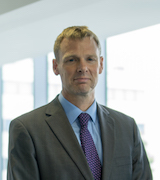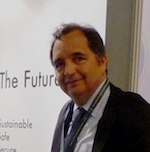Keynote & Invited Speakers
We are very pleased to be attracting the services of an excellent selection of keynote and invited speakers for the conference. It is our intention that these speakers will give our delegates a view about technological and scientific activities and policy relating to sustainability in energy and buildings, taking place in various areas of the world.
We have three Keynote and two Invited Speakers as follows:
Keynote speakers
Prof Denia Kolokotsa
Technical University of Crete Kounoupidiana, GreeceHow Smart Grids will affect the Built Environment
More details ...
Prof Chris Gorse
Leeds Beckett University, UKThermal Performance and Comfort: Addressing the Need to Upgrade in the UK
More details ...
Prof Paul Cooper
Sustainable Buildings Research Centre, University of Wollongong, AustraliaLow Income Households: Improving Energy Efficiency for Improved Quality of Life
More details ...
Invited speakers
Prof Theocharis Tsoutsos
Technical University of Crete Kounoupidiana, GreeceZero Energy Buildings of the Tertiary Sector Challenges, Building Capacities and Tools
More details ...
Prof Alfonso Capozzoli
TEBE Research Group, Department of Energy, Politecnico di Torino, ItalyMining typical load profiles in buildings to support energy management in the smart city context
The co-authors of the paper are Marco Savino Piscitelli (PhD fellow at Politecnico di Torino) and Silvio Brandi (Grant researcher at Politecnico di Torino)
More details ...
Prof Denia Kolokotsa
Technical University of Crete Kounoupidiana, GreeceHow Smart Grids will affect the Built Environment
Abstract:
Smart grids are electrical power grids that are more efficient and more resilient - therefore, "smarter" - than the existing conventional power grids. The smartness is focused not only on elimination of black-outs, but also on making the grid greener, more efficient, adaptable to customers' needs, and therefore less costly. Smart grids incorporate the innovative IT technology that allows for two-way communication between the utility and its customers/users. As a result the sensing along the transmission lines and the sensing from the customer's side is what makes the grid "smart". Like the Internet, the Smart Grid will consist of controls, computers, automation, new technologies, smart buildings and equipment working together, but in this case these technologies will work with the electrical grid to respond digitally to the users' quickly changing energy demands. The aim of the present paper is to present recent findings in smart buildings and technologies sector and identify the links between energy efficiency and Internet of Things through Smart Grids functionalities.

Biography:
Prof. Kolokotsa is currently an Associate Professor at the School of Environmental Engineering of the Technical University of Crete, Greece. Her research interests include energy management and Information and Computer Technologies for the built environment, energy efficiency and renewables. She is the Editor-in-Chief of the journal Advances in Building Energy Research, as well as an Editorial Board Member for Renewable Energy and Energy and Buildings. She is presently leading a research group working on a Horizon 2020 programme entitled SMART GEMS with more than 12 members participating from various research institutions in Europe. She has participated in more than 25 European and national projects, and coordinated 3 EU (FP7 and Horizon) projects and 3 national projects. Prof. Kolokotsa has developed expertise in the field of urban dynamics and environmental and ecological issues at the metropolitan and regional scale with emphasis on the urban heat island mitigation and adaptation strategies. She has authored more than 100 papers published in high impact scientific journals and conference proceedings. She is the current President of the European Cool Roofs Council.
Prof Chris Gorse
Leeds Beckett University, School of the Built Environment and Engineering, Leeds, UKThermal Performance and Comfort: Addressing the Need to Upgrade in the UK
Abstract:
While the UK has taken a back step with its commitment to zero carbon building, the need to improve the quality of the internal environment of existing buildings remains. Of the 26 million properties in Britain, many are drafty, poorly insulated, with inefficient fabrics that make them difficult to control and condition, and amongst the most expensive to heat in Europe. A high occurrence of thermal bridges, cold surfaces and bypasses, in these properties, renders the fabric susceptible to condensation and mould. Unfortunately, for those that live in damp and cold buildings, there is an impact on their health and wellbeing. When considering the scale of the challenge, the research on thermal upgrades is some way off providing the comprehensive understanding required to identify the appropriate steps to take. However, this research provides an insight into a deep retrofit project, where retrofit measures were introduced in stages, on a difficult to treat property, using off the shelf products to explore the benefits. Considerable savings were made, and greater control and energy efficiency were achieved. While further work is necessary, this project provides step forward in exploring the benefits and a better understanding of the challenges.

Biography:
Christopher Gorse is the Director of the Leeds Sustainability Institute and a Professor of Construction and Project Management at Leeds Beckett University. He is a Chartered Builder, Engineering Professors Council Member, with over 20 years industrial and academic experience in buildings, materials, management and construction law. He has written extensively on the construction of buildings, the processes required to deliver them successfully and measure their performance.
Chris is keen to push the boundaries of research, and as Vice Chair of the Association for Researchers in Construction Management and Sub Task Lead on three International Energy Agency projects he not only assembles expert research groups but is active in developing a better understanding of how buildings behave, can be made more efficient, controllable and play their role in the energy flexibility that is required to deliver a cleaner network of energy. The work involves undertaking laboratory tests and monitoring in the field, on whole buildings, individual elements and utilising building simulation and modelling software to characterise behaviour and develop methodologies to advance understanding.
Recently Chris has undertaken research and consultancy projects for the Building Research Establishment, Department of Energy and Climate Change, Department for Business Energy and Industrial Strategy, English Heritage and material suppliers. Projects range from simple monitoring and laboratory tests to multidisciplinary international projects that draw on the knowledge of behavioural scientists, statisticians, building physicists and modelling experts.
As Head of the Low Carbon Sustainability Research Group CeBE, Chris leads a research unit that has amassed one of the most comprehensive sets of actual building thermal performance data in the UK. The team has extensive knowledge and expertise in whole building performance, hygrorothermal properties of building elements (modelled and constructed) and inuse building energy consumption.
Prof Paul Cooper
Sustainable Buildings Research Centre, University of Wollongong, AustraliaLow Income Households: Improving Energy Efficiency for Improved Quality of Life
Abstract:
Low income households in Australia, as in other parts of the developed world, typically live in relatively poor quality housing and have little discretionary resources to spend on energy, or on improvements to the fabric of their home and the performance of appliances. This situation leads to fuel stress and negative impacts on quality of life.
This presentation takes an in-depth look at the current challenges facing policy-makers, researchers and households themselves, when making efforts to improve energy efficiency and consequent wellbeing of low-income households. An overview of the current policy framework in Australia, and analysis of recent programs that have piloted new strategies to improve low income household energy efficiency and well-being will be present. One outcome that has been clearly demonstrated in such programs is that a 'one-size-fits-all approach' to upgrading people's homes and helping them save energy, is not effective. Australia is not only a multi-cultural society, but also has a wide range of housing and household types, and programs such as the recent Australian Government's AU$55M Low Income Energy Efficiency Program (LIEEP), have shown that there we need tailored approaches to different demographics, cultures and climates.
Measuring the effectiveness of residential energy efficiency programs is anything but a trivial task, and recent research on the best approaches to program evaluation will be described.
Research results from projects undertaken by the multi-disciplinary teams at the University of Wollongong and elsewhere will be presented in relation to major energy efficiency retrofit and behaviour-change programs. This will include a case study of the $2.3M 'Energy+Illawarra' program that engaged over 800 households and involved the retrofit of 185 homes. This project included the development of a new house-and-household characterisation methodology, and associated retrofit assessment, allocation and implementation process. The impact of retrofits on occupant well-being, through measured changes to indoor thermal conditions and results from detailed ethnographic studies, for example, will also be discussed.

Biography:
Professor Paul Cooper is the founding Director of the University of Wollongong's Sustainable Buildings Research Centre (SBRC). The SBRC is a unique research centre with approximately 45 staff and students located in one of the most sustainable buildings in Australia. The SBRC Building itself is a net-zero energy living laboratory, which has won a 6 Star Green Star sustainability rating (the highest available) and is on track to be the first building in Australia to win full Living Building Challenge accreditation.
Paul has been involved in a wide range of research on sustainable buildings, renewable energy systems, energy efficiency and fluid mechanics over the past 35 years. His current research interests include: net-zero energy buildings; retrofitting existing dwellings; IEQ in aged care facilities and apartments; automation of natural ventilation systems; innovation in building management systems (BMS); photovoltaic-thermal, cool roof and other innovative building envelope technologies; retrofitting for bushfire resilience; and modular construction methods.
Prior to his present appointment as the Director of the SBRC, Paul was the Head of the School of Mechanical, Materials and Mechatronic Engineering at the University of Wollongong. He was also the Faculty Advisor and the lead academic on the winning Team UOW Solar Decathlon China 2013 campaign. This project culminated in Team UOW winning this first competition in Asia with the highest number of points scored by any team in the history of all the Solar Decathlon competitions around the world.
Prof Theocharis Tsoutsos
Technical University of Crete Kounoupidiana, GreeceZero Energy Buildings of the Tertiary Sector Challenges, Building Capacities and Tools
Abstract:
Tertiary sector buildings (hospitals, hotels, offices, etc), frequently visited by the public, should set an example in environmental and energy performance. They present a huge potential for Energy Efficiency applications, especially in Southern Europe.
Moreover, according to the European Directive on the Energy Performance of Buildings (EPBD) recast, being energy intensive buildings, they are at a high priority for becoming nearly Zero Energy Buildings (nZEB). According to the Clean Energy package of measures the European Union aims to bring forth Energy Efficiency (EE), following European Commission targets for 30% EE, reduction in CO2 emissions by 40% and increase RES to 27% in final consumption, by 2030.
In order to depict the current trends in EU energy efficiency and renewable energies, are exploited the main outputs (technical results, developed tools, critical recommendations of two EU projects):
- The actual energy performance of six south European countries (Greece, Croatia, France, Romania, Italy and Spain), analyzed in the framework of the nearly Zero Energy Hotels (neZEH) project financed by IEE Programme
- The Trust EPC South project of Six European countries (Portugal, Spain, France, Italy, Croatia and Greece) promoting Energy Performance Contracting (EPC) to overcome barriers such as access to finance for EPC providers, lack of certification schemes, insufficient public support financed by HORIZON 2020 Programme

Biography:
Theocharis Tsoutsos is Professor in the School of Environmental Engineering, Technical University of Crete, Director Graduate Programme "Environmental Engineering" (Apr 2014-); Head, Renewable and Sustainable Energy Lab (ReSEL) (2005-); Coordinator of the TUC-Energy Group (2013-)
Head, Development Dept (Centre for Renewable Energy Sources & Energy Saving - CRES -, 1992- 2005); Adjunct Prof. (Heriot-Watt University, TEI Piraeus, Kingston University, Open University, 1998- 2004);
Author of 75+ scientific publications in international scientific peer reviewed journals, 20+ book chapters, 200+ publications in conferences; 2,500+ citations h-factor:22 (Scopus); 26 (Google Scholar)
He has coordinated 40+ projects on RES and energy saving and participated in 100+ totally.
Project evaluator in European Research Council (ERC), REA (EC), Erasmus-Mundus (EC), GSRT (GR), State Scholarship Foundation (GR), Research Promotion Foundation (CY), Swiss National Science Foundation (SNSF); New Eurasia Foundation (RU);Netherlands Organisation for Scientific Research (NL); Welsh Government (UK)
Prof Alfonso Capozzoli
TEBE Research Group, Department of Energy, Politecnico di Torino, ItalyMining typical load profiles in buildings to support energy management in the smart city context
The co-authors of the paper are Marco Savino Piscitelli (PhD fellow at Politecnico di Torino) and Silvio Brandi (Grant researcher at Politecnico di Torino)Abstract:
Nowadays, smart meter technologies make possible a bi-directional communication between building infrastructures and operators, enabling the collection of a big volume of energy-related data in form of time series. As a consequence, in the last few years, an increasing interest of researchers and energy companies in exploring the potentialities of data analytics procedures to extract information on the actual building energy behavior was observed. The application of data analytics techniques coupled with a robust physics-based expertise can effectively support the implementation of procedures or strategies aimed at enhancing the operational performance of buildings. The analysis of time-series data has recently gained a lot of attention in the scientific community as a way to describe load patterns and boundary conditions which influence their particular variation over time. Mining typical load profiles in buildings to drive energy management strategies is a fundamental task to be addressed in a smart city environment. In the paper, a general framework on characterisation of load profiles in buildings based on the recent scientific literature is proposed. The process relies on the combination of different pattern recognition and classification algorithms in order to provide a robust insight of the energy usage patterns at different levels and scales (from single building to stock of buildings). Several implications related to energy profiling in buildings, including tariff design, customers' classification, demand side management, anomaly detection and advanced energy diagnosis are discussed. Moreover, a robust methodology to mine typical energy patterns to support advanced energy diagnosis in single buildings is introduced. Eventually, in order to demonstrate the scalability and effectiveness of the methodological process, an example of load characterisation for a cooling/heating mechanical room of Politecnico di Torino is presented.

Biography:
Alfonso Capozzoli graduated in Mechanical Engineering and obtained a PhD in Engineering of Mechanical Systems at University of Naples Federico II (Italy). Currently he works as assistant professor - with a tenure track position for associate professor- at the Department of Energy of Politecnico di Torino. From 2014 he is qualified for associate professor position (Italian Ministry for University and Research). He teaches HVAC systems and building physics at the Faculty of Engineering and Architecture in Politecnico di Torino.
His research activity is related to energy saving strategies in air conditioning systems, energy management in smart buildings, building energy fault detection and diagnosis, energy data analytics, thermal management in data centers and super insulating materials in building components.
He was general chair of the eighth International Conference on Sustainability in Energy and Buildings (SEB- 16) and chairman in various technical sessions in international conferences on building energy performance. He has been member of the Scientific or Organizing Committee of several conferences. He was involved as investigator in International research projects and in research groups of the International Energy Agency (IEA-EBC) on building energy performance. He has been responsible for different research/consultancy scientific contracts of the Department of Energy at the Politecnico di Torino. His research activity is summarized in more than 80 scientific papers published in international journals and conference proceedings. In 2017 he spent a period as visiting principal fellow at the Sustainable Buildings Research Centre (SBRC) of the University of Wollongong (Australia).


